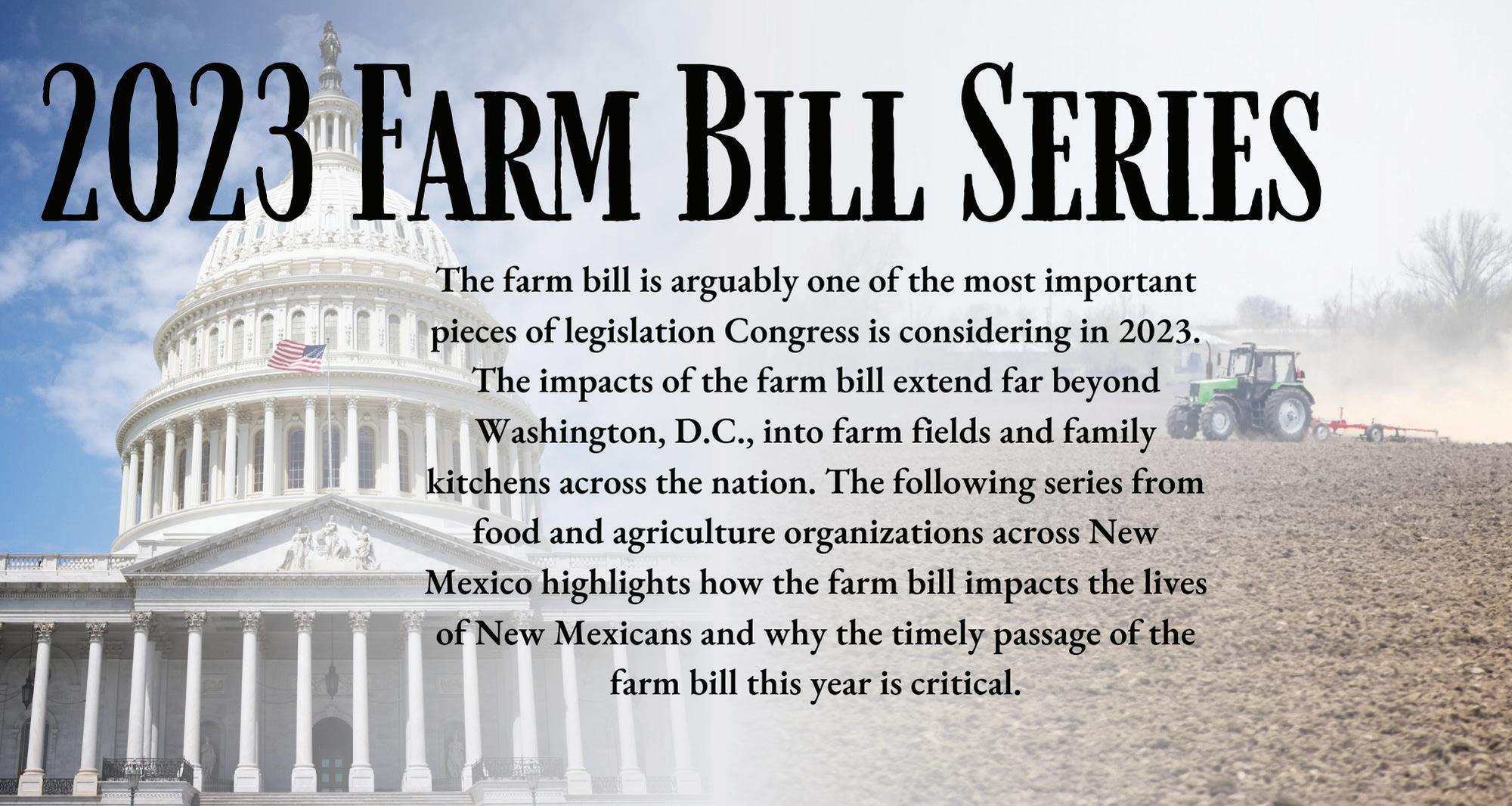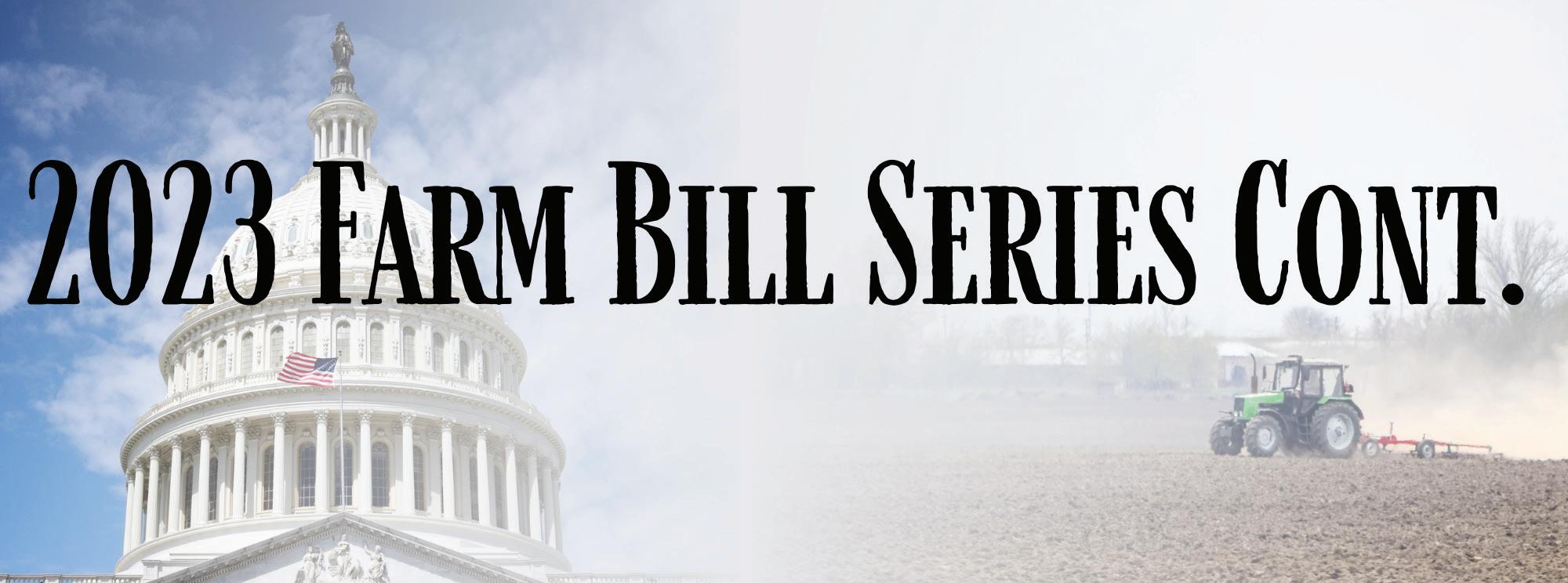
9 minute read
Scholarship NMF&LB Memorial
New Mexico Farm and Livestock Bureau looked toward the future of agriculture and awarded three outstanding students a $1,000 scholarship. The NMF&LB Memorial Scholarship is annually awarded to New Mexico students whose academic and personal achievements and aspirations show great promise for the future of agriculture. This year the committee selected Dalli Cain from Mountainair, Emma Hobbs from Roswell, Preslie Poling from Clayton.
“Each year we have outstanding students apply for this scholarship,” said NMF&LB Scholarship Committee Chair Gary Hathorn. “This year’s recipients show a true passion for agriculture, and the committee is happy to support them in pursuing their future careers.”
Dalli Cain graduated valedictorian of her class at Mountainair High School and plans to pursue a career in anesthesiology. In 2021 and 2022, Cain was the New Mexico High School Rodeo Champion Trap Shooter, and in 2021, placed 4th in light rifle at the National High School Rodeo Finals. She has held officer positions in the Mountainair FFA Chapter, Mountainair National Honor Society Chapter, local 4-H club, and Torrance 4-H County Council. Cain is a fifth-generation rancher, and although her chosen career field is outside of the agriculture industry, she said she plans to stay involved and continue to advocate for it.


“I have always felt that I am a great ambassador for the ranching industry,” said Cain. “I invite people to the ranch to teach them about our way of life. I enjoy having conversation about being good stewards of the land and the livestock.”
Emma Hobbs plans to attend Texas Tech University to study optometry.
“Personal health is a crucial concern for the majority of people in the U.S.,” said Hobbs. “Optometrists make an impact by serving others everyday.”
Hobbs is a three-time recipient of the Patrick Henry Dairy Award and serves as a Chaves County Dairy Ambassador. She is president of her local 4-H club and is corresponding secretary for Assisteens of Chaves County. She is also a student of Lively Piano Studio and Ruidoso Ballet Company. Hobbs graduated from her homeschool program in May while completing dual enrollment at Southeastern University.
Preslie Poling also plans to attend Texas Tech University to study business with a minor in agricultural communications. Poling is a graduate of Clayton High School. She served as treasurer of her FFA chapter, varsity basketball team captain, and student body treasurer. Poling served as the XIT Rodeo and Reunion Queen, Union County Fair Queen, and Union County Fair Princess.

“One need I see in the rural community I live in is keeping a sustainable population,” said Poling. “I want to help with finding ways to have quality jobs available in our communities, activities and programs for our youth and ways to help small businesses succeed. I believe that to be able to do this I need to have a good education and become involved at a local, state and even national level in many organizations that have made preserving agriculture their mission.”
NMF&LB proudly supports these students as the future of agriculture. We look forward to seeing them excel in their chosen careers.
Farm Bill Keeps Farmers on the Farm and Food on Your Table
By Larry Reagan, NMF&LB President
As a fourth-generation cattle rancher and president of the grassroots agriculture organization New Mexico Farm and Livestock Bureau, I am encouraged that Americans see the value of reauthorizing the farm bill in 2023 as clearly as I do. In fact, almost three-quarters of Americans say that not reauthorizing the farm bill would have a significant impact on the country, according to a recent poll from the American Farm Bureau Federation.
I have utilized several voluntary and incentive-based conservation programs funded by the farm bill to assist me in improving the natural resources throughout my family ranch. I started participating in the Conservation Stewardship Program (CSP) 11 years ago. I saw increased quantity and quality of grasses that soon brought a robust population of wildlife to our ranch. I have also utilized the Environmental Quality Incentives Program (EQIP) for mechanical brush control to improve our pasture quality, for cross fencing to support our rotational grazing management, and for pipeline installations to increase access to water for livestock and wildlife. I would not have been able to complete this work without the incentive-based conservation programs in the farm bill.
In addition to the conservation programs available through the farm bill, I also rely on federal crop insurance to pull our family ranch through the hard times. The extended drought we face in the West and across the country highlights the importance of these farm bill programs that serve as a safety net for farmers and ranchers. Insurance programs such as Pasture, Rangeland, and Forage (PRF), which I have personally used, are the bread and butter of the farm bill and have kept many farmers and ranchers like me in business over the past several years. According to the AFBF poll, nearly 70% of adults say these risk management programs that provide a safety net to farmers and ranchers, along with nutrition programs that support families facing hunger, should be a top priority for government funding in the farm bill.
While it’s vital Congress continues to support what has worked as they look to reauthorize the farm bill, we can also take this opportunity to improve it. Although the conservation programs are extremely beneficial and allow a lot of work to be done in improving our natural resources, there are some areas that could be improved to better serve all farmers and ranchers. The current system used to rank and score projects is falling short in serving our small and medium-sized producers because these producers have a hard time generating enough points to be competitive. Additionally, the inclusion of “supplemental projects” in contracts are oftentimes viewed as unnecessary or unwanted by farmers and ranchers but are required to secure the contract. Finally, we need to re-establish a lamb insurance program. NMF&LB and our state’s sheep producers believe that it is important to re-establish an insurance program that could provide some reassurance and protection from severe market volatility.
The farm bill touches family farms and ranches just like mine across New Mexico and the nation. I have used farm bill programs to better steward the natural resources entrusted to my care and keep my family ranch viable so the next generation has the opportunity to provide our community and nation with a safe and abundant food supply. I urge you to contact your member of Congress and encourage the timely reauthorization of the farm bill.

Farm Bill Vital to Supporting NMSU’s Mission

By Dr. Rolando A. Flores, NMSU College of ACES Dean and Chief Administrative Officer;
Dr.
Dr.
Jon Boren, NMSU Cooperative Extension Service Associate Dean and Director; &
Leslie D. Edgar, NMSU Agricultural Experiment Station Associate Dean and Director
The Farm Bill is pivotal to New Mexico State University’s College of Agricultural, Consumer and Environmental Sciences (ACES) ability to uphold our promise to New Mexico communities and our mission as a land-grant university.
The farm bill authorizes federal appropriations to be designated for land-grant universities to receive capacity funds, which includes Hatch, Hatch Multistate, McIntire-Stennis, Animal Health, and Smith-Lever Funds. These funding sources support research projects and Extension programs across New Mexico.
The Agricultural Experiment Station (AES) is the principal research unit of ACES. The AES system consists of scientists from NMSU’s main campus in the College of ACES and twelve agricultural science and research centers throughout the state. Research programs focus on four identified critical issues for New Mexico that will also have a global impact.
ACES critical issues include Food and Fiber Production and Marketing, Water Use and Conservation, Family Development and Health of New Mexicans, and Environmental Stewardship all of which are based on the foundation of education and training of qualified professionals in the field of agriculture.
These issues help guide research initiatives for federal capacity funded research through the U.S. Department of Agriculture’s National Institute for Food and Agriculture (NIFA).
NIFA capacity projects can include Hatch, Hatch multistate, McIntire-Stennis, Animal Health and Renewable Resources Extension programs. Each of these funding sources has specific distinctions for a research focus. These funds are leveraged with state funds to support additional research and outreach and enables the state Agricultural Experiment Station to pivot in response to unexpected events (e.g., COVID-19 pandemic and wildfires). The NMSU AES has 48 projects ongoing in various areas of research.
The Cooperative Extension Service (CES) provides a critical link between the research performed at public land-grant institutions and its implementation in local communities.
The New Mexico Cooperative Extension utilizes Smith-Lever funding through the Farm Bill to provide practical, research-based knowledge and programs to serve the citizens of New Mexico. CES has staff in all 33 counties and many Tribal areas in New Mexico, and collaborates with more than 1,000 organizations, state and federal agencies, other universities, and 10,000 volunteers.
We focus on collaboration to foster economic, educational, and community development, keeping the needs of our neighbors at the forefront of our work. Extension agents and specialists have worked during the last couple of years to create effective ways for youth to access science, technology, art, and math education opportunities as well as identify and address behavioral health concerns for not only our children and families, but also in our agricultural communities.
CES has worked in numerous ways to assist our communities hit the hardest by devasting wildfires and continues to work with multiple state agencies to protect our food supply and develop programs to address a wide range of potential threats to our agricultural infrastructure. CES specialists continue to address the challenges of making critical management decisions through extended drought conditions and work to promote economic development through agriculture.
As the NMSU College of ACES continues to serve the state by fostering excellence in research innovation while providing avenues to train future global leaders in agriculture and provide practical education to our communities these federal funding resources are as important to the success of our mission as they were more than a 100 years ago.
Farm Bill Provides Food Security for NM Families
By Lorenzo Alba, Jr., Casa de Peregrinos Food Pantry Executive Director
As the Farm Bill comes up for renewal in Congress, we are reminded again of its critical importance, not only to the New Mexico delegation, but to the entire House and Senate. Food assistance programs including the Supplemental Nutrition Assistance Program (SNAP) as well as funding for the nation’s food insecurity advocates like Feeding America, which are beacons of hope for countless individuals and families facing food insecurity, are funded through this bill, which also leverages state funding for these assistance programs.
But in New Mexico, with its rich history of agriculture, the Farm Bill is also a necessity for many small farmers who need assistance with natural and unforeseen crises that affect their business year to year, and help with equipment and new technology.
Here in New Mexico, where cultural heritage and economic disparities intersect, food pantries like ours serve as lifelines, bridging the gap between hunger and sustenance. They live out the motto of Casa de Peregrinos, “Food for Today, Hope for Tomorrow.” In the border region, food insecurity and poverty profoundly impact families and communities who are in urgent need of collective action. In Doña Ana County the poverty level has lingered at around 24% for many years in some areas of the county as high as 40%.
Food banks and food pantries such as ours have a strong intersection with the local agricultural community for fresh produce, not only because we want to purchase locally but also because of the generosity these farmers offer organizations such as ours, with donations and rebates. A robust Farm Bill, driven to improve value added agriculture and a steady food supply chain leads to both a healthy and prosperous local farmer, and food security for hungry families.
Food insecurity is one of the state’s largest social issues because of generational poverty, and legislators and local leaders have long been challenged in addressing it. A strong Farm Bill, which assists food-insecure New Mexicans as well as the New Mexico agricultural community will make a major impact on the lives of thousands of children, seniors, and our Native American neighbors.
I urge not only the New Mexico delegation to pass a Farm Bill that makes sense for not only our country but for our state, which is sensitive to the cultural differences from community to community and honors the unique dietary needs and traditions of these communities.

I ask you, as the Farm Bill comes up for a vote, not to forget the large numbers of food-insecure New Mexicans that all of you serve, as well as the small farmer in Hatch, the farming family in Array, the dairy farmer in Anthony, and the cattle rancher in northern Doña Ana County.
Put them at the forefront of how you vote and how important this bill is to New Mexicans.








